formerly eScholarship Editions


|
|
|
|
Your search for
'Intellectual History' in subject
found 61 book(s). | Modify Search | Displaying 1 - 20 of 61 book(s) | |
| 1. | 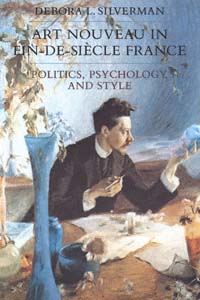 | Title: Art nouveau in fin-de-siècle France: politics, psychology, and style Author: Silverman, Debora Leah Published: University of California Press, 1989 Subjects: History | Art History | French Studies | European History | Intellectual History Similar Items |
| 2. | 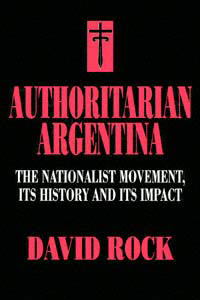 | Title: Authoritarian Argentina: the Nationalist movement, its history, and its impact Author: Rock, David 1945- Published: University of California Press, 1993 Subjects: History | Latin American Studies | Latin American History | Intellectual History Publisher's Description: David Rock has written the first comprehensive study of nationalism in Argentina, a fundamentalist movement pledged to violence and a dictatorship that came to a head with the notorious "disappearances" of the 1970s. This radical, right wing movement has had a profound impact on twentieth-century Ar . . . [more] Similar Items |
| 3. | 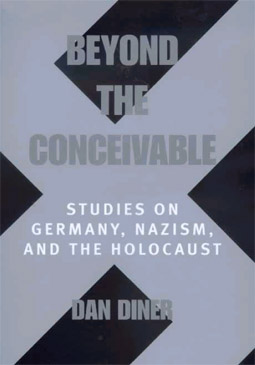 | Title: Beyond the conceivable: studies on Germany, Nazism, and the Holocaust Author: Diner, Dan 1946- Published: University of California Press, 2000 Subjects: German Studies | Jewish Studies | Intellectual History Publisher's Description: The major essays of Dan Diner, who is widely read and quoted in Germany and Israel, are finally collected in an English edition. They reflect the author's belief that the Holocaust transcends traditional patterns of historical understanding and requires an epistemologically distinct approach. One can no longer assume that actors as well as historians are operating in the same conceptual universe, sharing the same criteria of rational discourse. This is particularly true of victims and perpetrators, whose memories shape the distortions of historical narrative in ways often diametrically opposed. The essays are divided into three groups. The first group talks about anti-Semitism in the context of the 1930s and the ideologies that drove the Nazi regime. The second group concentrates on the almost unbelievably different perceptions of the "Final Solution," with particularly illuminating discussions of the Judenrat, or Jewish council. The third group considers the Holocaust as the subject of narrative and historical memory. Diner focuses above all on perspectives: the very notions of rationality and irrationality are seen to be changeable, depending on who is applying them. And because neither rational nor irrational motives can be universally assigned to participants in the Holocaust, Diner proposes, from the perspective of the victims, the idea of the counterrational. His work is directed toward developing a theory of Holocaust historiography and offers, clearly and coherently, the highest level of reflection on these problems. [brief] Similar Items |
| 4. | 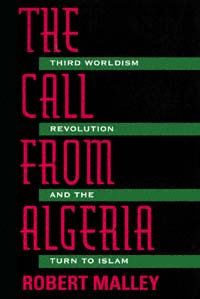 | Title: The call from Algeria: third worldism, revolution, and the turn to Islam Author: Malley, Robert 1963- Published: University of California Press, 1996 Subjects: Politics | History | Middle Eastern Studies | Islam | Intellectual History | African Studies Publisher's Description: The speed with which Algeria has gone from symbol of revolutionary socialism to Islamic battleground has confounded most observers. Charting Algeria's political evolution from the turn of the century to the present, Robert Malley explores the historical and intellectual underpinnings of the current crisis. His analysis helps makes sense of the civil war that is tearing Algeria apart.Using contemporary Algerian politics as a case study of the intellectual movement labeled "Third Worldism," Malley's thoughtful analysis also elucidates the broader transformations affecting countries of the Third World that once embraced ideologies of state-centered radical change. Malley focuses on the interplay between politics, economics, and ideology to explain the rise, essential components, and precipitous decline of Third Worldism - a movement that attracted scholars and activists in both the developed and underdeveloped worlds from the mid 1950s to the mid 1980s. He relates the disillusionment with Third Worldism to the growing appeal in the Third World of economic liberalism, versions of political pluralism, and ideological movements that threaten the very existence of the central state.At a time when the public increasingly is associating countries of the less developed world with Islamism, tribalism, and ethnic warfare, The Call from Algeria challenges our assumptions and offers a new perspective. [brief] Similar Items |
| 5. | 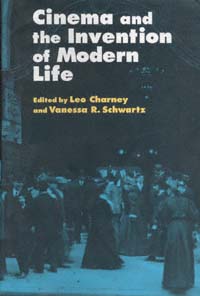 | Title: Cinema and the invention of modern life Author: Charney, Leo Published: University of California Press, 1996 Subjects: Cinema and Performance Arts | Film | Intellectual History | Popular Culture Publisher's Description: Casting aside the traditional conception of film as an outgrowth of photography, theater, and the novel, the essays in this volume reassess the relationship between the emergence of film and the broader culture of modernity. Contributors, leading scholars in film and cultural studies, link the popul . . . [more] Similar Items |
| 6. | 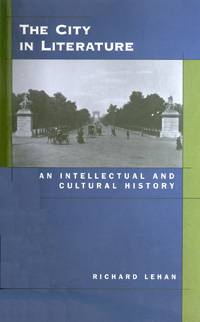 | Title: The city in literature: an intellectual and cultural history Author: Lehan, Richard Daniel 1930- Published: University of California Press, 1998 Subjects: Literature | Urban Studies | Intellectual History | Geography Publisher's Description: This sweeping literary encounter with the Western idea of the city moves from the early novel in England to the apocalyptic cityscapes of Thomas Pynchon. Along the way, Richard Lehan gathers a rich entourage that includes Daniel Defoe, Charles Dickens, Emile Zola, Bram Stoker, Rider Haggard, Joseph Conrad, James Joyce, Theodore Dreiser, F. Scott Fitzgerald, and Raymond Chandler. The European city is read against the decline of feudalism and the rise of empire and totalitarianism; the American city against the phenomenon of the wilderness, the frontier, and the rise of the megalopolis and the decentered, discontinuous city that followed. Throughout this book, Lehan pursues a dialectic of order and disorder, of cities seeking to impose their presence on the surrounding chaos. Rooted in Enlightenment yearnings for reason, his journey goes from east to west, from Europe to America. In the United States, the movement is also westward and terminates in Los Angeles, a kind of land's end of the imagination, in Lehan's words. He charts a narrative continuum full of constructs that "represent" a cycle of hope and despair, of historical optimism and pessimism.Lehan presents sharply etched portrayals of the correlation between rationalism and capitalism; of the rise of the city, the decline of the landed estate, and the formation of the gothic; and of the emergence of the city and the appearance of other genres such as detective narrative and fantasy literature. He also mines disciplines such as urban studies, architecture, economics, and philosophy, uncovering material that makes his study a lively read not only for those interested in literature, but for anyone intrigued by the meanings and mysteries of urban life. [brief] Similar Items |
| 7. | 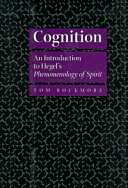 | Title: Cognition: an introduction to Hegel's Phenomenology of spirit Author: Rockmore, Tom 1942- Published: University of California Press, 1997 Subjects: Philosophy | Intellectual History Publisher's Description: Hegel's Phenomenology of Spirit , the philosopher's first and perhaps greatest work, is the most important philosophical treatise of the nineteenth century. In this companion volume to his general introduction to Hegel, Tom Rockmore offers a passage-by-passage guide to the Phenomenology for first-time readers of the book and others who are not Hegel specialists.Rockmore demonstrates that Hegel's concepts of spirit, consciousness, and reason can be treated as elements of a single, coherent theory of knowledge, one that remains strikingly relevant for the contemporary discussion. He shows how the various conceptions of cognition developed in the text culminate in absolute knowing, which Rockmore reads, in opposition to the frequent religious readings of Hegel, in a wholly secular manner. Unlike commentators who isolate Hegel's text from its philosophical origins, Rockmore analyzes the book in the philosophical context from which it emerged, lucidly discussing notoriously difficult passages in relation to the ideas of Aristotle and Descartes, and above all to those of Kant and other German idealists. [brief] Similar Items |
| 8. | 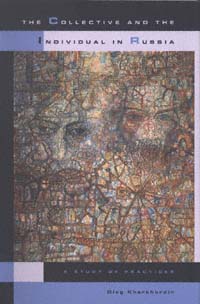 | Title: The collective and the individual in Russia: a study of practices Author: Kharkhordin, Oleg 1964- Published: University of California Press, 1999 Subjects: History | Social Theory | European History | Russian and Eastern European Studies | Intellectual History Publisher's Description: Oleg Kharkhordin has constructed a compelling, subtle, and complex genealogy of the Soviet individual that is as much about Michel Foucault as it is about Russia. Examining the period from the Russian Revolution to the fall of Gorbachev, Kharkhordin demonstrates that Party rituals - which forced each Communist to reflect intensely and repeatedly on his or her "self," an entirely novel experience for many of them - had their antecedents in the Orthodox Christian practices of doing penance in the public gaze. Individualization in Soviet Russia occurred through the intensification of these public penitential practices rather than the private confessional practices that are characteristic of Western Christianity. He also finds that objectification of the individual in Russia relied on practices of mutual surveillance among peers, rather than on the hierarchical surveillance of subordinates by superiors that characterized the West. The implications of this book expand well beyond its brilliant analysis of the connection between Bolshevism and Eastern Orthodoxy to shed light on many questions about the nature of Russian society and culture. [brief] Similar Items |
| 9. | 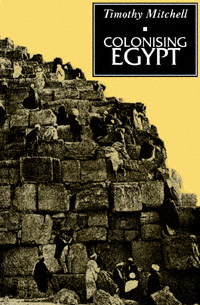 | Title: Colonising Egypt Author: Mitchell, Timothy 1955- Published: University of California Press, 1991 Subjects: Politics | Middle Eastern Studies | Cultural Anthropology | Middle Eastern History | Intellectual History | Postcolonial Studies Publisher's Description: Extending deconstructive theory to historical and political analysis, Timothy Mitchell examines the peculiarity of Western conceptions of order and truth through a re-reading of Europe's colonial encounter with nineteenth-century Egypt. Similar Items |
| 10. | 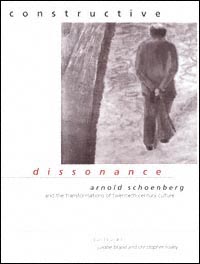 | Title: Constructive dissonance: Arnold Schoenberg and the transformations of twentieth-century culture Author: Brand, Juliane Published: University of California Press, 1997 Subjects: Music | Musicology | Composers | Intellectual History | Art History Publisher's Description: Arnold Schoenberg (1874-1951) is a pivotal figure of musical modernism. The "father of serialism" has influenced nearly every major composer of this century, and the idea of Schoenberg, now wild-eyed radical, now embattled moralist, now lonely prophet, is woven into the mythos of modern art. What is more, the sites of his professional activity - fin de siècle Vienna, the Berlin of the Weimar Republic, and his "exile to paradise" in Los Angeles - bring home the representative quality of his life and works, which bear witness to some of the defining experiences of our time.This collection by leading Schoenberg scholars is an interdisciplinary examination of the historical, aesthetic, and intellectual issues that formed Schoenberg's creative persona and continue to influence our response to the modernist legacy of the first half of this century. The book's first section, "Contexts," investigates Schoenberg's sense of ethnic, religious, and cultural identity. The second section, "Creations," focuses on specific works and the interplay between creative impulse and aesthetic articulation. The final section, "Connections," addresses the relationship of Schoenberg's legacy to present-day thought and practice. [brief] Similar Items |
| 11. | 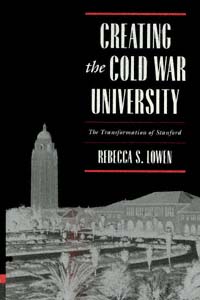 | Title: Creating the Cold War university: the transformation of Stanford Author: Lowen, Rebecca S 1959- Published: University of California Press, 1997 Subjects: History | Education | Technology and Society | Military History | Californian and Western History | History and Philosophy of Science | California and the West | Intellectual History | United States History | United States History Publisher's Description: The "cold war university" is the academic component of the military-industrial-academic complex, and its archetype, according to Rebecca Lowen, is Stanford University. Her book challenges the conventional wisdom that the post-World War II "multiversity" was created by military patrons on the one hand and academic scientists on the other and points instead to the crucial role played by university administrators in making their universities dependent upon military, foundation, and industrial patronage.Contesting the view that the "federal grant university" originated with the outpouring of federal support for science after the war, Lowen shows how the Depression had put financial pressure on universities and pushed administrators to seek new modes of funding. She also details the ways that Stanford administrators transformed their institution to attract patronage.With the end of the cold war and the tightening of federal budgets, universities again face pressures not unlike those of the 1930s. Lowen's analysis of how the university became dependent on the State is essential reading for anyone concerned about the future of higher education in the post-cold war era. [brief] Similar Items |
| 12. | 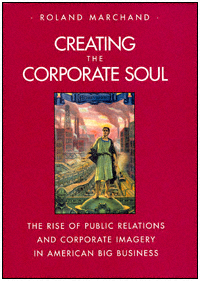 | Title: Creating the corporate soul: the rise of public relations and corporate imagery in American big business Author: Marchand, Roland Published: University of California Press, 1998 Subjects: History | American Studies | Popular Culture | Intellectual History | Media Studies | Economics and Business Publisher's Description: Over the course of the twentieth century the popular perception of America's giant corporations has undergone an astonishing change. Condemned as dangerous leviathans in the century's first decades, by 1945 major corporations had become respected, even revered, institutions. Roland Marchand's lavishly illustrated and carefully researched book tells how large companies such as AT&T and U.S. Steel created their own "souls" in order to reassure consumers and politicians that bigness posed no threat to democracy or American values.Marchand traces this important transformation in the culture of capitalism by offering a series of case studies of such corporate giants as General Motors, General Electric, Metropolitan Life Insurance, and Du Pont Chemicals. Marchand examines the rhetorical and visual imagery developed by corporate leaders to win public approval and build their own internal corporate culture. In the "golden era" of the 1920s, companies boasted of their business statesmanship, but in the Depression years many of them turned in desperation to forms of public relations that strongly defended the capitalist system. During World War II public relations gained new prominence within corporate management as major companies linked themselves with Main-Street, small-town America. By the war's end, the corporation's image as a "good neighbor" had largely replaced that of the "soulless giant." American big business had succeeded in wrapping increasingly complex economic relationships in the comforting aura of familiarity.Marchand, author of the widely acclaimed Advertising the American Dream (1985), provides an elegant and convincing account of the origins and effects of the corporate imagery so ubiquitous in our world today. [brief] Similar Items |
| 13. | 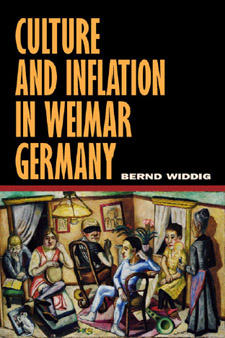 | Title: Culture and inflation in Weimar Germany Author: Widdig, Bernd Published: University of California Press, 2001 Subjects: German Studies | European History | Intellectual History | European Literature Publisher's Description: For many Germans the hyperinflation of 1922 to 1923 was one of the most decisive experiences of the twentieth century. In his original and authoritative study, Bernd Widdig investigates the effects of that inflation on German culture during the Weimar Republic. He argues that inflation, with its dyn . . . [more] Similar Items |
| 14. |  | Title: Downcast eyes: the denigration of vision in twentieth-century French thought Author: Jay, Martin 1944- Published: University of California Press, 1993 Subjects: Philosophy | Intellectual History | French Studies | Literary Theory and Criticism | Art Theory Publisher's Description: Long considered "the noblest of the senses," vision has increasingly come under critical scrutiny by a wide range of thinkers who question its dominance in Western culture. These critics of vision, especially prominent in twentieth-century France, have challenged its allegedly superior capacity to provide access to the world. They have also criticized its supposed complicity with political and social oppression through the promulgation of spectacle and surveillance.Martin Jay turns to this discourse surrounding vision and explores its often contradictory implications in the work of such influential figures as Jean-Paul Sartre, Maurice Merleau-Ponty, Michel Foucault, Jacques Lacan, Louis Althusser, Guy Debord, Luce Irigaray, Emmanuel Levinas, and Jacques Derrida. Jay begins with a discussion of the theory of vision from Plato to Descartes, then considers its role in the French Enlightenment before turning to its status in the culture of modernity. From consideration of French Impressionism to analysis of Georges Bataille and the Surrealists, Roland Barthes's writings on photography, and the film theory of Christian Metz, Jay provides lucid and fair-minded accounts of thinkers and ideas widely known for their difficulty.His book examines the myriad links between the interrogation of vision and the pervasive antihumanist, antimodernist, and counter-enlightenment tenor of much recent French thought. Refusing, however, to defend the dominant visual order, he calls instead for a plurality of "scopic regimes." Certain to generate controversy and discussion throughout the humanities and social sciences, Downcast Eyes will consolidate Jay's reputation as one of today's premier cultural and intellectual historians. [brief] Similar Items |
| 15. |  | Title: Envisioning power: ideologies of dominance and crisis Author: Wolf, Eric R 1923- Published: University of California Press, 1999 Subjects: Anthropology | Social Theory | Social and Political Thought | Political Theory | Intellectual History Publisher's Description: With the originality and energy that have marked his earlier works, Eric Wolf now explores the historical relationship of ideas, power, and culture. Responding to anthropology's long reliance on a concept of culture that takes little account of power, Wolf argues that power is crucial in shaping the circumstances of cultural production. Responding to social-science notions of ideology that incorporate power but disregard the ways ideas respond to cultural promptings, he demonstrates how power and ideas connect through the medium of culture.Wolf advances his argument by examining three very different societies, each remarkable for its flamboyant ideological expressions: the Kwakiutl Indians of the Northwest Pacific Coast, the Aztecs of pre-Hispanic Mexico, and National Socialist Germany. Tracing the history of each case, he shows how these societies faced tensions posed by ecological, social, political, or psychological crises, prompting ideological responses that drew on distinctive, historically rooted cultural understandings. In each case study, Wolf analyzes how the regnant ideology intertwines with power around the pivotal relationships that govern social labor. Anyone interested in the history of anthropology or in how the social sciences make comparisons will want to join Wolf in Envisioning Power . [brief] Similar Items |
| 16. | 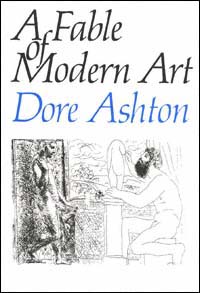 | Title: A fable of modern art Author: Ashton, Dore Published: University of California Press, 1991 Subjects: Art | Art History | Art Theory | Intellectual History Publisher's Description: Dore Ashton's masterly analysis of modern art grows out of a consideration of Balzac's brilliant and little known 'philosophic' story The Unknown Masterpiece in which the concerns of Cézanne, Picasso, and the abstract expressionists are strikingly prefigured. Balzac's fable is discussed not only within the context from which it emerged - early nineteenth-century romanticism - but also in its embodiment of various attitudes towards art. Ashton illuminates a web of associations linking Balzac to Cézanne, Rilke, Schoenberg, Kandinsky and Picasso as they struggle with the yearning to express the inexpressible, to make concrete the abstract.As Professor Ashton develops the conjectures of her book she reveals the interrelations of literature, music, and art and the basic problems which engage or beset the contemporary artist and those who seek to understand and appreciate contemporary art. This is a book of extreme originality which ranges so widely and offers such valuable insights that it forms an important contribution not only to the history of art and culture, but also to the history of ideas. [brief] Similar Items |
| 17. | 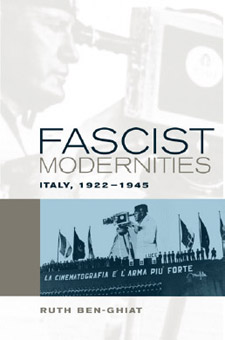 | Title: Fascist modernities: Italy, 1922-1945 Author: Ben-Ghiat, Ruth Published: University of California Press, 2001 Subjects: European Studies | History | Intellectual History | European History Publisher's Description: Ruth Ben-Ghiat's innovative cultural history of Mussolini's dictatorship is a provocative discussion of the meanings of modernity in interwar Italy. Eloquent, pathbreaking, and deft in its use of a broad range of materials, this work argues that fascism appealed to many Italian intellectuals as a new model of modernity that would resolve the contemporary European crisis as well as long-standing problems of the national past. Ben-Ghiat shows that - at a time of fears over the erosion of national and social identities - Mussolini presented fascism as a movement that would allow economic development without harm to social boundaries and national traditions. She demonstrates that although the regime largely failed in its attempts to remake Italians as paragons of a distinctly fascist model of mass society, twenty years of fascism did alter the landscape of Italian cultural life. Among younger intellectuals in particular, the dictatorship left a legacy of practices and attitudes that often continued under different political rubrics after 1945. [brief] Similar Items |
| 18. | 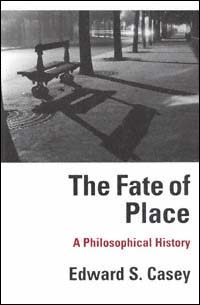 | Title: The fate of place: a philosophical history Author: Casey, Edward S 1939- Published: University of California Press, 1997 Subjects: Philosophy | Classical Philosophy | Architecture | Intellectual History | Geography Publisher's Description: In this imaginative and comprehensive study, Edward Casey, one of the most incisive interpreters of the Continental philosophical tradition, offers a philosophical history of the evolving conceptualizations of place and space in Western thought. Not merely a presentation of the ideas of other philosophers, The Fate of Place is acutely sensitive to silences, absences, and missed opportunities in the complex history of philosophical approaches to space and place. A central theme is the increasing neglect of place in favor of space from the seventh century A.D. onward, amounting to the virtual exclusion of place by the end of the eighteenth century.Casey begins with mythological and religious creation stories and the theories of Plato and Aristotle and then explores the heritage of Neoplatonic, medieval, and Renaissance speculations about space. He presents an impressive history of the birth of modern spatial conceptions in the writings of Newton, Descartes, Leibniz, and Kant and delineates the evolution of twentieth-century phenomenological approaches in the work of Husserl, Merleau-Ponty, Bachelard, and Heidegger. In the book's final section, Casey explores the postmodern theories of Foucault, Derrida, Tschumi, Deleuze and Guattari, and Irigaray. [brief] Similar Items |
| 19. | 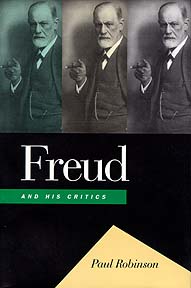 | Title: Freud and his critics Author: Robinson, Paul A 1940- Published: University of California Press, 1993 Subjects: History | Intellectual History | Autobiographies and Biographies | Psychology | Psychiatry Publisher's Description: Wars against Freud have been waged along virtually every front during the past decade. Now Paul Robinson takes on three of Freud's most formidable critics, mounting a thoughtful, witty, and ultimately devastating critique of the historian of science Frank Sulloway, the psychoanalyst Jeffrey Masson, and the philosopher Adolf Grünbaum.Frank Sulloway contends that Freud took most of his ideas from Darwin and other contemporary thinkers - that he was something of a closet biologist. Jeffrey Masson charges that Freud caved in to peer pressure when he abandoned his early seduction theory (which Masson believes was correct) in favor of the theory of infantile sexuality. Adolf Grünbaum impugns Freud's claim to have grounded his ideas - especially the idea of the unconscious - on solid empirical foundations.Under Robinson's rigorous cross-examination, the evidence of these three accusers proves ambiguous and their arguments biased by underlying assumptions and ideological commitments. Robinson concludes that the anti-Freudian writings of Sulloway, Masson, and Grünbaum reveal more about their authors' prejudices - and about the Zeitgeist of the past decade - than they do about Freud.Beautifully crafted and full of surprises, Robinson's work is a compelling defense of one of history's most original and powerful minds. Freud and His Critics will earn an enduring place in the raging Freudian debate. [brief] Similar Items |
| 20. | 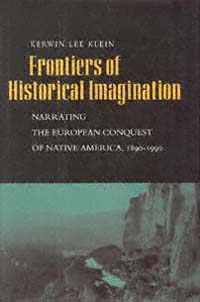 | Title: Frontiers of historical imagination: narrating the European conquest of native America, 1890-1990 Author: Klein, Kerwin Lee 1961- Published: University of California Press, 1997 Subjects: History | California and the West | American Studies | Anthropology | United States History | Intellectual History | Postcolonial Studies Publisher's Description: The American frontier, a potent symbol since Europeans first stepped ashore on North America, serves as the touchstone for Kerwin Klein's analysis of the narrating of history. Klein explores the traditions through which historians, philosophers, anthropologists, and literary critics have understood the story of America's origin and the way those understandings have shaped and been shaped by changing conceptions of history. The American West was once the frontier space where migrating Europe collided with Native America, where the historical civilizations of the Old World met the nonhistorical wilds of the New. It was not only the cultural combat zone where American democracy was forged but also the ragged edge of History itself, where historical and nonhistorical defied and defined each other. Klein maintains that the idea of a collision between people with and without history still dominates public memory. But the collision, he believes, resounds even more powerfully in the historical imagination, which creates conflicts between narration and knowledge and carries them into the language used to describe the American frontier. In Klein's words, "We remain obscurely entangled in philosophies of history we no longer profess, and the very idea of 'America' balances on history's shifting frontiers." [brief] Similar Items |